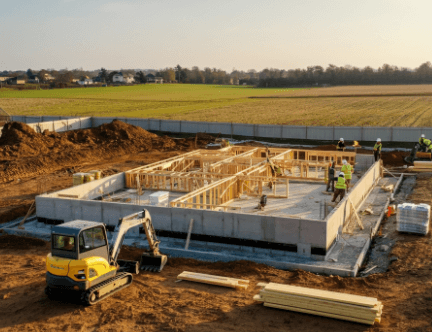What is a foundation in construction? A foundation in construction is the structural element that transfers the load of a building or structure to the ground, providing stability and support. Buying or selling land is a big decision, and understanding the basics of construction can greatly enhance your expertise in the real estate market. In this post, we will talk about what a foundation in construction is, why it matters, and how it influences your property investment decisions. Whether you’re a land seller, real estate investor, or land buyer, this guide is for you.
In real estate investment, understanding the importance of a solid foundation in construction is crucial for success. Investors like Steve Daria and Joleigh emphasize that a well-built foundation affects a property’s structural integrity and influences its long-term value. By prioritizing sound construction practices, they ensure their investments are secure and resilient against potential challenges.
Why Foundation in Construction Matters
The foundation is crucial in construction because it serves as the primary support system for the entire structure.
It disburses the weight of the building evenly across the ground, ensuring that the load does not concentrate in one area and causes potential instability.
By transferring and dispersing these loads, the foundation helps maintain the building’s structural integrity and prevents issues such as shifting or settling.

Without a properly designed and constructed foundation, even the most aesthetically pleasing and well-engineered buildings can experience significant problems, including cracks, uneven floors, or compromised safety.
The Role of Foundations
Foundations serve several critical functions:
Load Distribution
Foundations play a crucial role in evenly distributing the weight of the building across the soil or bedrock.
This distribution prevents excessive pressure on any single point, which can lead to uneven settling or shifting of the structure.
By spreading the load, foundations help maintain the level of floors and walls, reducing the risk of structural problems over time.
Proper load distribution is essential for the longevity and durability of the building, ensuring that it remains stable and functional throughout its lifespan.
Stability
Foundations are integral in providing stability to a building by anchoring it securely to the ground.
They are designed to resist various environmental factors, such as strong winds, earthquakes, and soil movement, which could otherwise jeopardize the building’s structural integrity.
By anchoring the building firmly, the foundation helps prevent excessive swaying or shifting that could damage the structure or endanger its occupants.
Additionally, a well-constructed foundation can adapt to minor ground movements and changes, enhancing the overall resilience of the building.
Moisture Barrier
A well-designed foundation includes measures to prevent water infiltration, which is vital for protecting the building from moisture-related issues.
Foundations are often equipped with waterproofing materials and drainage systems to direct water away from the structure and stop it from seeping into the foundation walls.
By effectively managing moisture, the foundation helps to avoid problems such as mold growth, wood rot, and corrosion of reinforcement materials.
Moisture control is crucial for preserving the health of the building’s interior environment and ensuring that structural components remain intact.
Get Started: Get Your Cash Offer Below…
We are direct land buyers. There are no commissions or fees and no obligation whatsoever. Start below by sharing where your property is and where we can send your offer…
Types of Foundations
There are several types of foundations in construction:
Shallow Foundations
Shallow foundations are commonly utilized for smaller structures and are designed to support buildings by distributing the load near the surface of the ground.
Common types include spread footings, which are individual pads of concrete placed under columns or walls to spread the load, and slab-on-grade foundations, where a single concrete slab serves as both the foundation and floor of the building.
These foundations are suitable for areas with stable, well-compacted soil close to the surface and are generally more cost-effective and quicker to construct compared to deep foundations.
Deep Foundations
Deep foundations are required for larger or heavier buildings or in areas where the surface soil is not capable of supporting the structure.
They extend deeper into the ground to reach more stable soil or bedrock layers, providing support where shallow foundations would be inadequate.
Types of deep foundations include pile foundations, which use long columns driven or drilled into the ground to transfer the load, and drilled shafts, which involve boring deep holes and filling them with concrete to create strong vertical supports.
Factors Influencing Foundation Choice
Several factors determine the type of foundation used in a construction project:
- Soil Type: The formation and stability of the soil affect the foundation’s design.
- Load: The building’s weight and intended use influence the foundation’s strength requirements.
- Environmental Conditions: Weather, water table levels, and seismic activity impact foundation choice.
Key Strategies for Assessing Foundations
When investing in real estate, assessing the foundation’s quality is crucial.
Here are some strategies to consider:
- Inspecting the Soil: Soil tests can reveal important information about soil-bearing capacity, moisture content, and compaction.
- Evaluating Load-Bearing Capacity: Ensure the foundation can support the structure’s weight. This involves checking the materials used, the depth of the foundation, and the construction techniques applied.
- Looking for Signs of Damage: Visible cracks, uneven floors, and water seepage are red flags. A professional inspection can uncover hidden issues that might not be immediately apparent.
Practical Tips in Real Estate
Whether you are buying or selling property, having a keen eye on the foundation in construction can lead to better investment decisions:
For House Buyers
- Hire an Inspector: Always get a detailed inspection report focusing on the foundation.
- Check the History: Investigate any past repairs or foundation issues.
- Budget for Repairs: If there are minor issues, factor in the cost of potential repairs.

For Land Sellers
- Provide Soil Reports: Offering comprehensive soil reports can boost buyer confidence.
- Highlight Quality: If the foundation is newly built or recently repaired, make it a selling point.
- Transparency: Be upfront about any past foundation issues and how they were resolved.
For Real Estate Investors
- Assess ROI: Consider the cost of foundation repairs vs. the potential increase in property value.
- Stay Updated: Keep abreast of new foundation technologies and methods.
- Network: Connect with construction experts who can provide reliable assessments.
Frequently Asked Questions
Explore the most common queries about foundations in construction:
Can foundation issues be fixed?
Yes, many foundation problems can be repaired using techniques like underpinning, slab jacking, and sealing cracks.
However, the cost and complexity of repairs vary.
How long does a foundation last?
A well-built foundation can last up to 100 years or more, but this depends on factors like the quality of materials, construction methods, and environmental conditions.
Do I always need a professional inspection?
Absolutely. A professional inspection provides a thorough analysis, identifying issues that might not be visible to the untrained eye and offering peace of mind.
Conclusion
Understanding the importance of a strong foundation in construction is vital for anyone involved in real estate. Whether you are buying, selling, or investing, being knowledgeable about foundations can help you make better decisions, avoid costly repairs, and ultimately ensure the long-term stability and value of your property.
**NOTICE: Please note that the content presented in this post is intended solely for informational and educational purposes. It should not be construed as legal or financial advice or relied upon as a replacement for consultation with a qualified attorney or CPA. For specific guidance on legal or financial matters, readers are encouraged to seek professional assistance from an attorney, CPA, or other appropriate professional regarding the subject matter.
